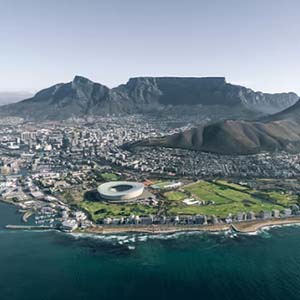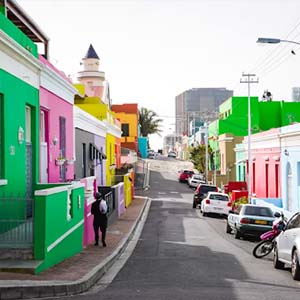Moving to Cape Town
Cape Town is South Africa’s oldest European settlement and known to be one of the most beautiful cities in the world. At the continent’s southern tip, the Cape of Good Hope creates a sheltered bay of lovely white beaches, rich fishing grounds, lush parklands and green areas. Cape Town is also just north of Table Mountain, which provides a stunning background to the mixture of modern high-rise buildings and charming Cape Dutch townhouses.
Cape Town is a city of contrasts with a mixture of European and African elements. With a population of 4.5 million, the city is known to be the most liberal, educated and integrated in the country, however dramatic differences between rich and poor remain. It is also called the cultural centre of South Africa with many museums, art galleries, cinemas, and theatres. The pleasant Mediterranean climate also makes Cape Town perfect for a more outdoor lifestyle.
What is the cost of moving to Cape Town?
If you are thinking about the cost of moving to Cape Town, visas can be particularly expensive at up to £130 per person so make sure you consider this. A general work visa is the most common type but there are a huge number of Visas too. It is recommended that you use a removal company to assist, as they can often provide advice on things like visas.

Areas at a Glance
Cape Town is a fairly compact city. The suburbs of Tamboersksloff, Oranjezicht, and Gardens are known as the “City Bowl” which is also the old city centre. The central business and shopping areas lie along Adderley Street and the surrounding streets. The Parliament of South Africa resides in Cape Town, meeting from February until June. The Parliament buildings sit in the city centre to the north end of the park, Company’s Gardens.
As one of the best places to visit in the world, Cape Town is popular among expats worldwide. The suburbs to the South, newer areas in the Northern and Western suburbs as well as along the Atlantic coast are all popular and are known to be the best neighbourhoods to live in Cape Town for expats.
With Gerson Relocation, our Area Orientation Services ensure you get to know your new location. Preview trips to Cape Town will prepare you for your international relocation.
Public Transport in South Africa
Compared to many other capital cities around the world, Cape Town has relatively poor public transport links. The MyCiti bus system is very efficient, however is still affected by traffic congestion and has limited connections so only services some areas of the city. Buses are also affordable to use, with trips at just a few Rand each and even less when purchased as part of a bulk order.
Taxis operate around Cape Town as an alternative to buses, but they can become expensive for long journeys when including the starting fee. The city is also serviced by Uber drivers.
Additionally, as Cape Town is a rather compact city, it is possible to walk to many places that you need to visit.
Driving around Cape Town
Owning a private vehicle when living in Cape Town is the preferred method of transport around the city, with a good network of roads around the city and the rest of South Africa. Local fuel prices are reasonable. While traffic conditions can be difficult, the city’s compact nature and comprehensive network of roads are relatively easy to navigate, making it quick and simple to get where you need to go.

Airport Travel
Cape Town International Airport is South Africa’s second largest airport. It is located around 12 miles from the city centre and the journey takes roughly 10 minutes by car. Many of the airport’s facilities have recently been upgraded and expanded to accommodate higher passenger capacity.
It is possible to rent cars and hail taxis from Airport terminals. There is also an Airport shuttle service to transport people to and from the airport. Facilities in the airport include banking services, shopping facilities, restaurants, medical services and more.
Where to Live in Cape Town
Cape Town has a variety of different suburbs with a range of types of housing. Housing areas in Cape Town can range from affluent neighbourhoods with large, landscaped gardens and swimming pools to middle-class suburbs with three- or four-bedroom houses on smaller lots and suburbs with smaller homes and garden areas. Apartments come in a variety of sizes including penthouses, smaller bachelor, or single accommodation with a range of facilities available.
In all South African cities and suburbs, security is a serious consideration for most residents. There are varying degrees of security facilities fitted to most homes for expatriate residents, including electric fences, high walls, alarm systems etc. Suburban communities generally hire security patrols, providing armed response services 24-hours-a-day for a fee. If the landlord of a residential complex does not provide 24-hour security surveillance, it is recommended that you source it privately.
If you require assistance in your home search, our experts are here to help. Gerson Relocation Home Search Service can guarantee you the right accommodation for you. Get a free quote with us today.

Best Neighbourhoods to Live in Cape Town
The majority of suburbs are located within a 20-minute drive of the city centre. While there are some public transport connections to some suburbs, many expats use their own vehicles for commuting or leisure trips.
Southern Suburbs
The Southern suburbs in Cape Town stretch from Rondebosch to Constantia, including Newlands, Claremont, Kenilworth, and Bishopscourt. This area is perfect for access to most of the better quality schools including the American International School of Cape Town and the International School of Cape Town. Bishopscourt is just a 10-15-minute drive from the centre of town and offers large homes with a peaceful suburban ambience. Additionally, Constantia Valley has become very popular among expats moving to Cape Town, meaning that it is difficult to find affordable property here.
Atlantic Seaboard
Suburbs in this area include Sea Point, Bantry Bay, Clifton, Camps Bay, and Llandudno. These neighbourhoods offer a more cosmopolitan lifestyle for young couples and singles moving to Cape Town. There are a range of high-rise apartment buildings as well as gorgeous homes overlooking the coast.
Camps Bay is very popular among expats, as is Clifton, a more fashionable and expensive suburb. Om Clifton, the living space is normally cramped and parking can be difficult to find. Sea Point is another popular residential area, an older suburb full of high-rise apartment buildings, hotels, and restaurants with many residences facing the ocean for great views. These housing options generally have more living space.
City Bowl is located above the city centre, on the shallow slopes of Table Mountain. These neighbourhoods are close to the city centre and offer spectacular views, meaning that prices are generally high.
Hout Bay Valley offers a range of farm-style houses and newer townhouse developments, offering security and minimum care for frequent travellers. European expatriates moving to Cape Town tend to prefer this area. It is also home to the Hout Bay International School.
Northern and Western Suburbs
These suburbs have newly developed areas available and are popular among young families. Good value properties are available in Durbanville to the north and Tableview in the west, which both offer good access to the city centre, airport, and wine-producing areas.
Expatriate Life in Cape Town
South Africans are friendly but reserved people. Social life for expatriates living in Cape Town will involve interacting with other expatriates as well as South African residents. Customs and culture can differ depending on the company you find yourself in so it’s important to be receptive and pick up appropriate customs and habits.
Aside from making friends with colleagues and their families, there is a range of clubs and activities to get involved with to meet more people. The warmer weather in Cape Town makes perfect for more active lifestyles and a wealth of sports and exercise opportunities. There are also many clubs for expatriates living in Cape Town for you to meet other international residents from the UK or other countries. There are also expat clubs for specific interests, such as the Cape Buccaneers for sports fans and Rotary Clubs in Cape Town.
Our Relocation Services don’t stop after your move. Our Settling-In Assistance is there at a local level to ensure you are adjusting well to your new life overseas.

Interested in information on another country? Take a look at our other International Relocation guides.
Great customer Experiences start here
Very pleasent and helpful. Nothing too much trouble.
Mr M H moved from London, UK to Toronto, Canada
Very helpful and patient even when things got packed that we had to get out again!
Mr M E moved from Enfield, UK to Dorset, UK
Thanks to Graham, Nick and the entire crew!
Mr C D M moved from UK to Singapore
Friendly and helpful crew.
Ms T W moved from USA to Cambridgeshire, UK
